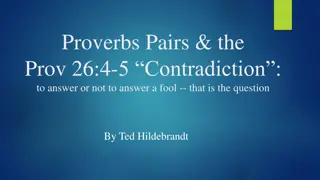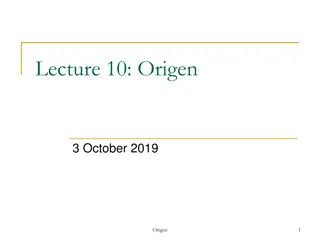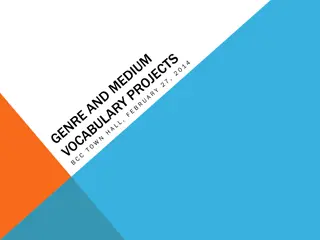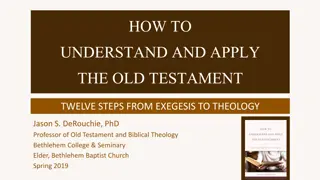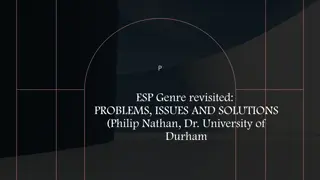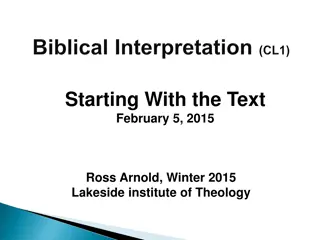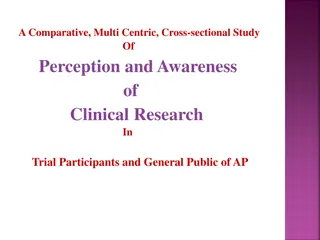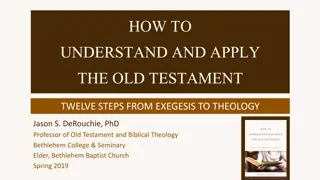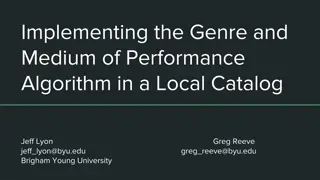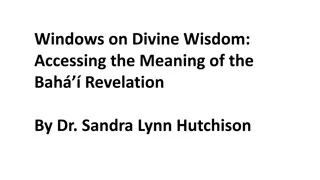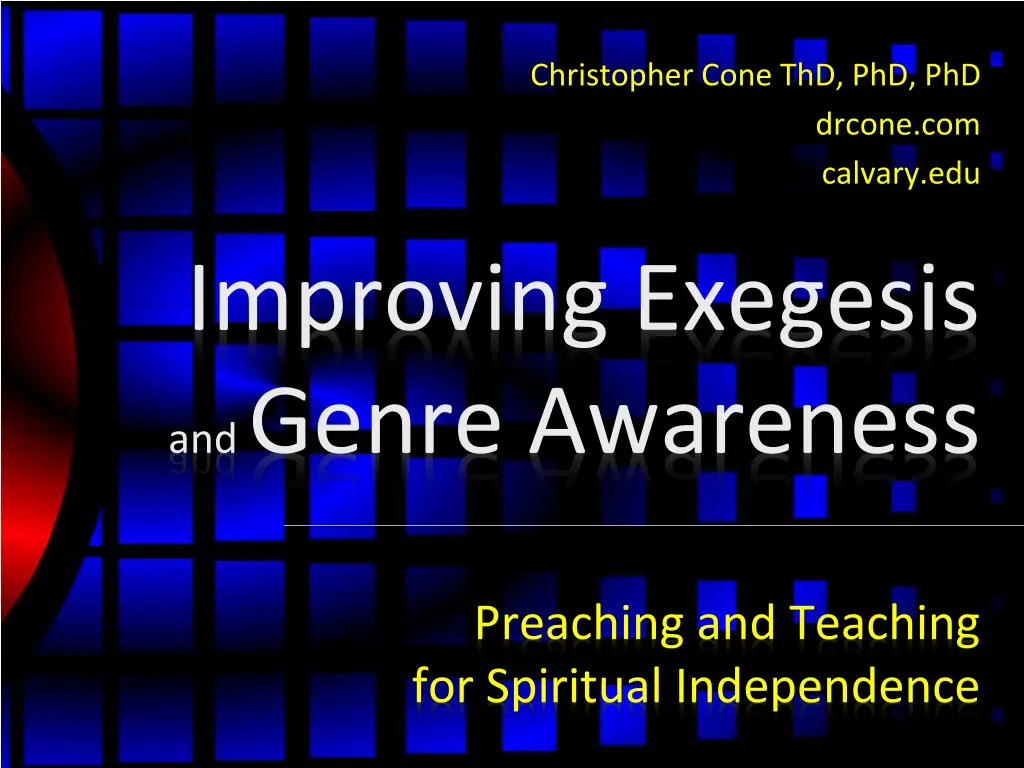
Improving Exegesis and Genre Awareness in Preaching and Teaching
Enhance your exegesis skills and genre awareness with Dr. Christopher Cone as he provides insights into refining exegetical processes and stages of interpretation. Learn about the importance of Literal-Grammatical-Historical (LGH) interpretation and how it applies to biblical hermeneutics. Discover the textual, linguistic, and worldview logic behind LGH and delve into the logic of LGH in the exegesis process.
Download Presentation

Please find below an Image/Link to download the presentation.
The content on the website is provided AS IS for your information and personal use only. It may not be sold, licensed, or shared on other websites without obtaining consent from the author. If you encounter any issues during the download, it is possible that the publisher has removed the file from their server.
You are allowed to download the files provided on this website for personal or commercial use, subject to the condition that they are used lawfully. All files are the property of their respective owners.
The content on the website is provided AS IS for your information and personal use only. It may not be sold, licensed, or shared on other websites without obtaining consent from the author.
E N D
Presentation Transcript
Christopher Cone ThD, PhD, PhD drcone.com calvary.edu Improving Exegesis and Genre Awareness Preaching and Teaching for Spiritual Independence
Part 1 Refining Your Exegetical Process
Introduction: 3 Related Stages Stage 1 Epistemological basis for preferring Literal Grammatical-Historical (LGH) Stage 2 Applying LGH to the exegetical process Stage 3 Ground rules for praxis, exposition
First-Stage Textual Logic of LGH P1 Genesis contains almost 100 speech acts of God P2 In the roughly 70 instances in which we see the response, the response shows His speech act was understood with LGH P3 Genesis spans the first 2500 years of recorded history P4 The hermeneutic model used for the first 2500 years holds unless there is an announced change P5 There is no announced change P6 NT use of the OT reflects continuity in hermeneutic method P7 The Biblical hermeneutic model is LGH C Therefore, LGH must be employed
First-Stage Linguistic Logic of LGH: P1 There exists a God who created P2 Language and humanity originated from God P3 God communicated w/ humanity using language P4 God s use of language confirms language as suitable vehicle for revelation P5 Earliest recipients understood meaning based on normative use P6 Earliest interpretive model was based on face value, and recognized grammar and historical context P7 LGH best represents this approach C If we are to understand the intended meaning in the same way, LGH must be employed
Second-Stage Logic of LGH: Exegesis Step 1 Verify Text and Translation Step 2 Understand Background, Context Step 3 Identify Structure Step 4 Identify Grammatical, Syntactical Keys Step 5 Identify Lexical Keys Step 6 Identify Biblical Context Step 7 Identify Theological Context
Step 1 Verify Text and Translation P66, John 3:13 Stephen s TR, John 3:13 , . ,
Step 1 Verify Text and Translation P66, John 3:13 Stephen s TR, John 3:13 , . , Was Jesus concurrently in heaven and earth???
Step 2 Understand Background, Context Mt 27:52-53 The tombs were opened, and many bodies of the saints who had fallen asleep were raised; 53 and coming out of the tombs after His resurrection they entered the holy city and appeared to many. Is this Graeco-Roman bios, or is it historical/theological narrative? Is this special effects?
Step 3 Identify Structure Genesis - eleven (generations) John 20:30-31 - (signs) Acts 1:8 - geographical, chronological markers Revelation 1:19 three chronological markers
Step 4 Identify Grammatical, Syntactical Keys Acts 2:38 Peter said to them, Repent, and each of you be baptized in the name of Jesus Christ for the forgiveness of your sins; and you will receive the gift of the Holy Spirit. Acts 2:38 , [ ,] .
Step 4 Identify Grammatical, Syntactical Keys Acts 2:38 Peter said to them, Repent, and each of you be baptized in the name of Jesus Christ for the forgiveness of your sins; and you will receive the gift of the Holy Spirit. Acts 2:38 , [ ,] .
Step 4 Identify Grammatical, Syntactical Keys Acts 2:38 Peter said to them, Repent, and each of you be baptized in the name of Jesus Christ for the forgiveness of your sins; and you will receive the gift of the Holy Spirit. Acts 2:38 , [ ,] .
Step 5 Identify Lexical Keys Daniel 9:24 Seventy weeks have been decreed Weeks or sevens? Hebrew , plural for seven Greek , plural for seven
Step 6 Identify Biblical Context 2 Chron 7:14 and My people who are called by My name humble themselves and pray and seek My face and turn from their wicked ways, then I will hear from heaven, will forgive their sin and will heal their land. 2 Chron 7:15 Now My eyes will be open and My ears attentive to the prayer offered in this place. The immediate context qualifies God s promise
Step 6 Identify Biblical Context Job 34:35-37 Job speaks without knowledge, And his words are without wisdom. 36 Job ought to be tried to the limit, Because he answers like wicked men. 37 For he adds rebellion to his sin; He claps his hands among us, And multiplies his words against God. 34 Men of understanding will say to me, And a wise man who hears me The immediate context gives voice to the statements that follow, exonerating Elihu and indicting his friends
Step 7 Identify Theological Context Jn 14:2-3 house are many dwelling places; if it were not so, I would have told you; for I go to prepare a place for you. 3 If I go and prepare a place for you, I will come again and receive you to Myself, that where I am, there you may be also. In My Father s
Step 7 Identify Theological Context Jn 14:2-3 house are many dwelling places; if it were not so, I would have told you; for I go to prepare a place for you. 3 If I go and prepare a place for you, I will come again and receive you to Myself, that where I am, there you may be also. In My Father s He goes He prepares a place He comes again He receives them to Himself
Second-Stage Logic of LGH: Exegesis Step 1 Verify Text and Translation Step 2 Understand Background, Context Step 3 Identify Structure Step 4 Identify Grammatical, Syntactical Keys Step 5 Identify Lexical Keys Step 6 Identify Biblical Context Step 7 Identify Theological Context
Third-Stage Logic of LGH: Praxis and Exposition Understanding is necessary for praxis If LGH is necessary for understanding, LGH is necessary for praxis Exposition is a part of praxis, LGH is a necessary component of exposition
Third-Stage Logic of LGH: Praxis and Exposition Correct praxis without correct exposition is oxymoronic Col 3:16 Let the word of Christ richly dwell within you, with all wisdom teaching and admonishing one another All believers are exhorted to teach one another exposition is not just pastoral Heb 5:12 For though by this time you ought to be teachers Arguably, all believers are to make disciples a process that includes teaching
Purpose, Content, and Mechanics of Biblical Teaching: For Equipping The Purpose: equipping for every good work (Eph 4:12; 2 Tim 3:17) The Content: The teacher doesn t equip, the word does equip (2 Tim 3:17) The Mechanics: entrusting the word of God (2 Tim 2:2)
Measuring Effectiveness: Capability to Reproduce Are learners developing ability to teach others the word of God? Do we give them the tools to do so? Are we teaching for spiritual independence? Are we showing them how to discover and learn for themselves?
Conclusion We must teach the Text as it is, and we must show (model) our work Doing, while being observed is a critical component of the teaching process Can our spiritual children and grandchildren, by following our example, grow to maturity?
Part 2 Refining Your Genre Awareness
Second-Stage Logic of LGH: Exegesis Step 1 Verify Text and Translation Step 2 Understand Background, Context Step 3 Identify Structure Step 4 Identify Grammatical, Syntactical Keys Step 5 Identify Lexical Keys Step 6 Identify Biblical Context Step 7 Identify Theological Context
Step 3 Identify Structure Genesis - eleven (generations) John 20:30-31 - (signs) Acts 1:8 - geographical, chronological markers Revelation 1:19 three chronological markers
Biblical Genres Historical Narrative Prophecy Poetic Epistolary Apocalyptic??? Near East Myth??? Greco_Roman Bios???
Biblical Genres Historical Narrative Prophecy Poetic Epistolary Apocalyptic??? Near East Myth??? Greco_Roman Bios???



